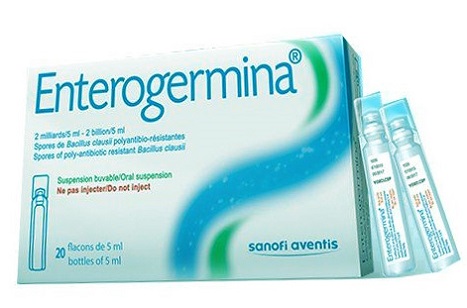South African Authorities Warn of A. clausii Blood Infection Linked to Sanofi’s Enterogermina Probiotic
Nikhil Prasad Fact checked by:Thailand Medical news Team Nov 25, 2024 1 year, 2 months, 3 weeks, 3 days, 4 hours, 38 minutes ago
Medical News: Outbreak Discovered in Gauteng and North West Hospitals
The National Institute for Communicable Diseases (NICD) has raised alarms over an outbreak of Alkalihalobacillus clausii (A. clausii) bacteraemia in South Africa. This rare bloodstream infection has been linked to the use of the popular probiotic product, Enterogermina, manufactured by pharmaceutical giant Sanofi. The outbreak has been identified in private hospitals across Gauteng and North West provinces, with 11 cases reported since January 2024.
 South African Authorities Warn of A. clausii Blood Infection Linked to Sanofi’s Enterogermina Probiotic
South African Authorities Warn of A. clausii Blood Infection Linked to Sanofi’s Enterogermina Probiotic
The issue came to light on June 11, 2024, when a vigilant pathologist from a private laboratory reported an unusual spike in cases of A. clausii bacteraemia. Following the alert, the NICD launched an in-depth investigation to trace the source of the infections. This
Medical News report provides an overview of the findings and the steps being taken to address the outbreak.
Investigations Confirm Probiotic as the Likely Source
The NICD’s investigation involved analyzing microbiological records of patients who tested positive for A. clausii in their blood cultures from January to October 2024. The results were startling - most of the patients had used Enterogermina probiotics before falling ill. Samples from four infected patients and two open packets of the probiotic were subjected to whole genome sequencing at the NICD laboratory.
The sequencing results confirmed that the probiotic Enterogermina was the likely source of the outbreak. While Enterogermina is widely marketed for its ability to restore gut health and manage antibiotic-associated diarrhea, it appears that in some cases, its usage might have led to severe complications, particularly in vulnerable patients.
Understanding A. clausii and Its Role as a Probiotic
A. clausii, formerly known as Bacillus clausii, is a spore-forming Gram-positive bacterium with known probiotic properties. It is commonly prescribed to promote gut health by suppressing harmful bacteria and reducing inflammation. Enterogermina and similar products containing A. clausii are considered safe for most individuals, including children and immunocompromised patients.
However, this outbreak highlights the potential risks associated with using probiotics in specific populations. Severely immunocompromised patients may be at higher risk of complications, as their weakened immune systems struggle to prevent the bacteria from spreading into the bloodstream.
NICD’s Recommendations for Healthcare Providers
To mitigate the outbreak, the NICD has issued several recommendations to healthcare providers and hospitals:
https://www.nicd.ac.za/probiotic-use-linked-to-alkalihalobacillus-clausii-blood-infection-outbreak-in-gauteng-and-north-west-hospita
ls-november-2024/
-Immediate Reporting: Hospitals and pharmacies have been instructed to report all A. clausii bacteraemia cases to the South African Health Products Regulatory Authority (SAHPRA).
-Cluster Investigations: Facilities experiencing clusters of cases must investigate to rule out any healthcare-associated sources of infection.
-Patient and Provider Education: Healthcare professionals are urged to educate patients on the risks and safe use of probiotics, particularly for those with compromised immune systems.
-Product Evaluation: Further scrutiny of Enterogermina and its distribution is underway to ensure no contaminated batches remain in circulation.
Implications for Probiotic Safety
This incident raises critical questions about the safety of probiotics in clinical settings. While probiotics like Enterogermina are generally considered beneficial, their unregulated use among vulnerable populations could lead to unintended health risks. It is essential for healthcare providers to carefully evaluate a patient’s condition, immune status, and contraindications before recommending such products.
Conclusion
The A. clausii bacteraemia outbreak linked to Enterogermina serves as a reminder of the importance of vigilance in healthcare. Probiotics, though widely regarded as safe, may carry risks in certain scenarios, particularly for immunocompromised individuals. The NICD’s swift response and thorough investigation have been vital in containing the outbreak and protecting public health. Moving forward, increased awareness, better education on probiotic use, and stricter product monitoring are crucial to prevent similar incidents.
Thailand
Medical News would further like to add that readers should be aware that usage of probiotics especially after COVID-19 infections should always be monitored by a doctor preferably a gastroenterologist as SARS-CoV-2 infections and even some of the COVID-19 vaccines have been found to able to destroy the gut-barrier or even cause dysfunction intestinal barrier issues and consumption of certain probiotics can lead to blood infections.
For the latest on probiotics, keep on logging to Thailand
Medical News.
Read Also:
https://www.thailandmedical.news/news/probiotic-lactobacillus-rhamnosus-for-weight-control
https://www.thailandmedical.news/news/the-anti-inflammatory-power-of-probiotic-lactiplantibacillus-plantarum-z22-found-in-fermented-vegetables
https://www.thailandmedical.news/news/probiotics-shown-to-improve-ibs-anxiety-symptoms
https://www.thailandmedical.news/news/new-probiotic-eradicates-crohn-s-disease-biofilms
https://www.thailandmedical.news/news/probiotics-american-gastroenterological-association-aga-issues-new-guidelines-not-supporting-the-use-of-probiotics-for-many-digestive-conditions
